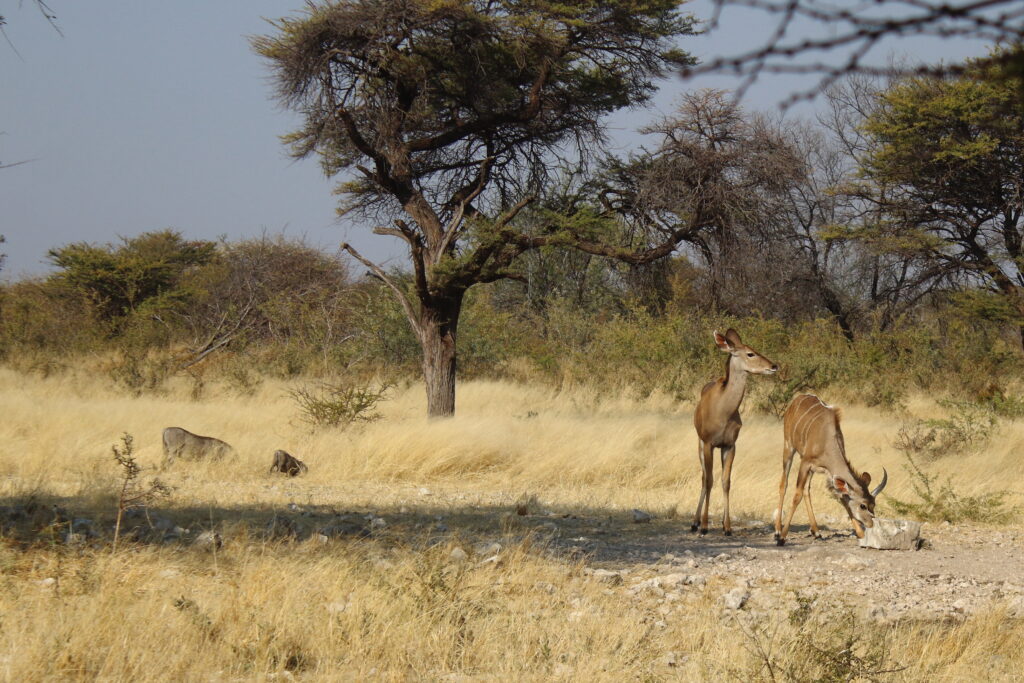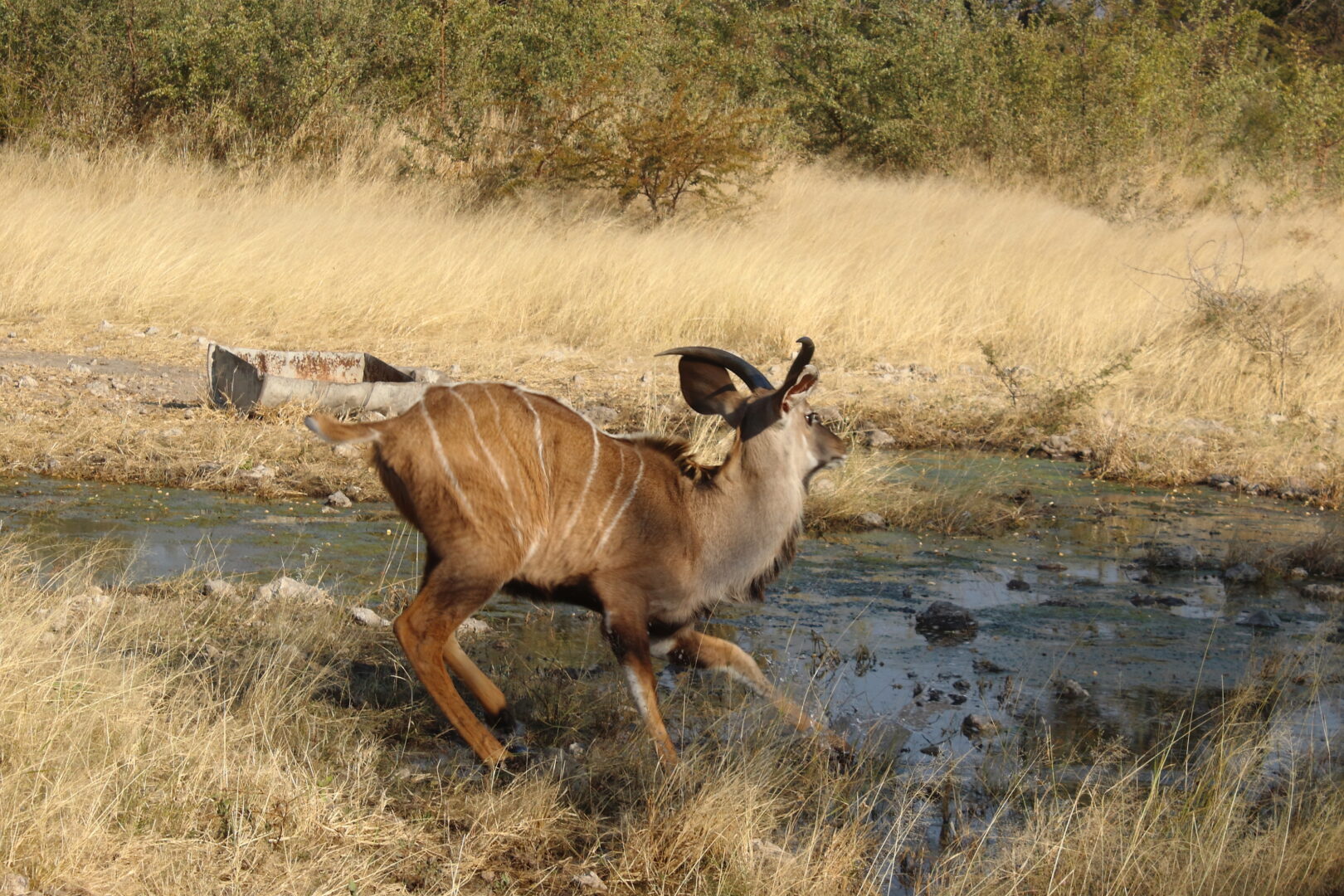Namibia stands as a premier destination for international hunters, drawing over 5,000 visitors annually and serving as a favourite for seasoned African hunting veterans, family groups, and first-time hunters alike. Gelnhausen Safaris, a private hunting farm near Otavi, offers an easy, safe, and affordable gateway to great plains-game hunting. This definitive guide synthesizes all the essential practical, legal, and logistical information you need to plan your successful and ethical hunting adventure at Gelnhausen.
Hunting in Namibia: An Overview of the Experience
Namibia is renowned for its political stability and secure environment, making it a reliable choice for international travel. Most hunting activities in the country are conducted on private game ranches, which collectively offer a diverse landscape for a challenging and rewarding safari. The habitat at Gelnhausen and surrounding areas varies significantly, ranging from dense thorny savannah to expansive semi-desert plains. Hunters should note that the relatively high elevation of the central plains, where many prime hunting areas are situated, can present a physical challenge for the less fit, so preparation is key.

The Huntable Species and Seasons
The plains game that is most commonly hunted across the northern, central, and southern parts of Namibia includes species such as oryx, greater kudu, Cape eland, blue wildebeest, black wildebeest, blesbok, impala, steenbok, klipspringer, springbok, and warthog7. For those interested in the Big Five, leopard are primarily found in the south and central regions, while lion, buffalo, elephant, and rhino are largely restricted to the north and are hunted on a limited quota basis8.
The official trophy-hunting season in Namibia opens on 1 February and closes on 30 November9. No hunting is permitted during December and January10. Legal hunting hours are strictly regulated, taking place from half an hour before sunrise to half an hour after sunset11. Key periods to note are:
- Peak Season: May – August12.
- Mid Season: April and September13.
- Low Season: February – March and October – November14.
The Principles of Fair Chase
All trophy hunting at Gelnhausen must be conducted in strict adherence to the principles of Fair Chase15. Fair chase is universally defined as the pursuit of a free-roaming animal that possesses the natural inclination and freedom to escape the hunter16. To maintain this ethical standard, several practices are prohibited:
- Hunting for trophies at night or with the aid of an artificial light171717.
- Hunting from a motorized mode of transportation18.
- Hunting with dogs19.
- Taking female animals that have dependent young20.
An animal designated for sport-hunting should exist as a naturally interacting member of a sustainable wild population within an area large enough for it to breed, forage, and hunt freely21. Upon arrival at Gelnhausen, a mandatory rifle sight-in will be done at the well-equipped shooting range before your safari commences22.
Firearms and Ammunition: Critical Requirements
The laws governing the temporary importation of hunting weapons into Namibia are straightforward and free of charge, but they are precise23.
Rifle Specifications
Each hunting client is permitted a maximum of two firearms for their safari24.
- Smallest Calibre: The smallest permissible calibre is .270252525.
- Ammunition: It is suggested to bring 60–80 rounds of calibre-specific ammunition per firearm26.
- Recommended Cartridges: For plains game, the recommended calibres include .30-06 Springfield, .300 and .338 Winchester Magnum, and .375 calibres27. Hard copper bullets, such as the Hornady GMX, are considered ideal28.
- Minimum Energy (Muzzle Velocity): Specific minimum energy levels are required depending on the game category:
- Small Game (e.g., springbok, duiker): 1,350 Joules (J)29.
- Medium Game (e.g., hartebeest, wildebeest, kudu, gemsbok, eland): 2,700 Joules (J)30.
Bow-Hunting and Prohibitions
Bow-hunting is permitted in Namibia, and no import permit is required for the bow itself31313131. The minimum energy requirements for bows are:
- Small Game: 25 ft/lb32.
- Medium Game: 40 ft/lb33.
The following items are strictly not permitted for hunting in Namibia 34:
- Automatic and semi-automatic weapons (including military hardware like the AK47).
- Handguns.
- Crossbows.
- Solid-point cartridges.
Note that while it is legal to hunt with black-powder-cartridge rifles, the volatile nature of black-powder and percussion caps means they cannot be imported into Namibia; they must be purchased locally upon arrival35.
Pre-Trip Logistics: Permits, Travel, and Packing
Successful pre-trip planning, especially concerning documentation, travel, and packing, is essential for a smooth safari experience.
Hunting Permits and Importation
Gelnhausen Safaris will manage the necessary trophy-hunting and export permits on your behalf36. To do this, you must provide a certified copy of your passport37. A separate hunting permit is issued by the Namibian Ministry of Environment & Tourism (MET) for each hunting client before the hunt begins, allowing a maximum of two trophies per species per hunter38.
For firearms, the importation process involves several steps:
- Airline Check: Ensure the airline you are booked on is “firearms friendly,” as some carriers do not allow them39.
- Required Documents: Upon entry into Namibia, you must present the completed firearm import/export application form, a copy of your hunting permit (which Gelnhausen will provide via email in advance), and a Letter of Invitation from the farm40. Carrying a copy of your gun licence or proof of ownership, while not legally required, is highly recommended41.
- Packing Regulations: Firearms must be packed separately, unloaded, in a sturdy, lockable case42. Ammunition (up to 100 rounds per firearm) must be in its original packaging, in a separate sturdy, lockable case, and checked in with your luggage43.
It is also mandatory to ensure your country of origin allows the importation of your target-species trophies44.
Travel and Insurance
Travel Agent: Due to the complexity of arranging travel with firearms, it is strongly advised to appoint a trusted travel agent, preferably one who specializes in hunting safaris to Namibia. They can help navigate airline regulations, secure the best pricing, and advise on insurance45.
Flights: Most international flights, with the exception of some from Frankfurt (Lufthansa), route through Johannesburg, South Africa, to Hosea Kutako International Airport (WHK) near Windhoek46.
Transiting through South Africa: If your itinerary requires transiting through South Africa, it is vital to check with your airline. Your firearms and ammunition should ideally be transited straight through without paperwork if you remain in the transit area47. If this is not possible, you will need to apply for a temporary firearm import permit from the South African Police Services (SAPS) using the SAPS 520 form, along with a separate South African letter of invitation from Gelnhausen48. Leave a minimum of three hours between connecting flights at Johannesburg International Airport to complete all legalities49.
Health and Insurance: Comprehensive health insurance is strongly advised. You must inform your insurer that you will be participating in a hunting safari, as some companies classify this as an “extraordinary risk”50. Medical evacuation coverage from a provider like Global Rescue is also highly recommended51.
Entry Requirements: Your passport must be valid for at least six months past your intended departure date and have a minimum of six blank pages52. A valid return or onward air ticket is also required53.
The Essential Packing List
Gelnhausen Safaris offers daily laundry service, so bear this in mind when determining quantities54. The daily temperature can swing by as much as $20^{\circ}C$ ($35^{\circ}F$) from day to night, making layers an absolute necessity55.
Clothing:
- For the Hunt: Light, breathable, quick-drying fabric (like cotton or synthetic) in camouflage colours (greens, browns, khaki, olive)56565656. Bring sturdy, comfortable long pants and long-sleeved shirts57575757.
- Winter Months (May–September): A warm jacket or heavyweight fleece is a must for the cool evenings around the fire58. Include gloves, a woolly hat, and a windbreaker for cold travel on the hunting vehicle during early mornings and late afternoons59595959.
- Footwear: Pack well-fitted, well-broken-in hunting boots60606060. Casual shoes or sandals are useful for in-camp and travel61.
Hunting Gear & Optics:
- Primary Gear: Rifle, scope, sling, and ammunition 62.
- Optics: Binoculars (minimum 8×30) 63636363and a range finder64.
- Shooting: A good variable scope is useful, as shots can range from 110 yards (100m) in thick bush up to 250 yards (230m) on open plains65. A shooting stick is highly recommended, and Gelnhausen can provide one if you don’t bring your own66.
Essentials and Safety:
- Documents & Medication (Carry-On): Carry all valuables, medications (with a copy of the prescription), and one change of clothing plus your hunting boots in your carry-on luggage in case checked bags are delayed67676767. Carry copies of your passport and visa68.
- Health & Comfort: High-SPF sunscreen and lip balm, sunglasses, sun hat, and insect repellent (essential, especially between sundown and sunrise)696969696969696969. A small first-aid kit with analgesics, antihistamines, and antiseptic ointment is recommended70.
- Electronics: Camera (with charger/batteries), torch, and electric converters/plug adapters (Namibia uses Type D, 220/230V AC)717171717171717171.
Post-Safari Matters: Tipping and Trophies
Tipping Guidelines
Tipping is customary and serves as a direct acknowledgement of excellent service, though it is not mandatory72. It is best to give tips to the manager at the end of the trip, preferably in US dollars, for fair distribution among the staff73.
This is a rough guide based on standard practice74:
- Professional Hunter: 5% (for average service) up to 15% (for great service) of the total hunt cost (daily rate and trophy fees combined, excluding tax)75.
- Tracker: US$10–15 per day76.
- All Other Staff (collectively): US$10–15 per day77.
While thoughtful gifts are appreciated, cash is the preferred form of tip for most staff members78.
Trophies and Taxidermy
Once your hunt is complete, Adventure Services International is Gelnhausen’s preferred taxidermy partner, dedicated to preserving your trophies and memories79. They handle the necessary paperwork and services80. Clients will receive an invoice for their trophies, and production begins upon receipt of full payment, which is to be made via bank wire transfer81.
A hunting safari with Gelnhausen in Namibia promises an experience rich in both challenge and reward. By meticulously following this guide on legal requirements, travel preparation, and hunting ethics, you will be well-equipped for a safe, successful, and unforgettable adventure.
